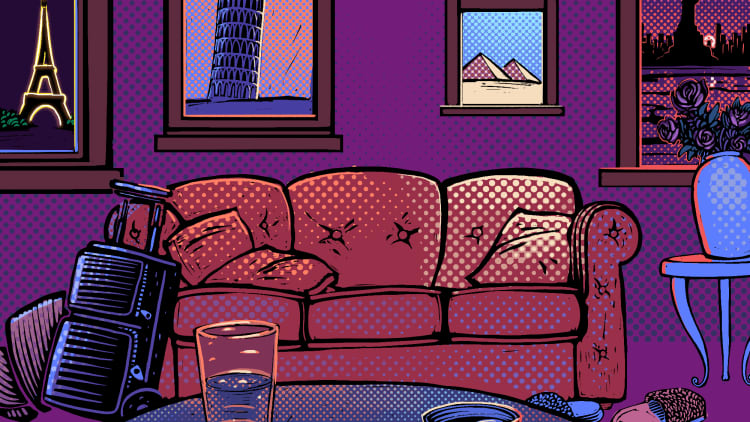
Airbnb is unusual among privately held start-ups in that it's already profitable.
The No. 1 company on the 2017 CNBC Disruptor 50 list has reportedly said it can reach $3 billion in profit by 2020. It was valued at $31 billion last year, meaning that only Marriott's $39 billion valuation is greater in the lodging industry.
But after forcing the biggest changes in travel since Priceline and Expedia, it's running out of easy room to grow against the lodging companies. To keep up its rapid growth, Airbnb needs to upend the entire travel experience.
Airbnb's recent $1 billion round of financing was huge, but also showed its lowest valuation step-up — a measure of valuation increase from financing round to round — in the history of the company. In
Dan Cook, a PitchBook senior analyst, said when growth stops accelerating and begins to level off, it's harder to maintain huge valuation step-ups.
"Airbnb supply is still growing aggressively, and there is a lot more demand today, but [hotel investors] were more freaked out in 2014 and 2015," said Jared Shojaian, leisure, gaming and lodging analyst at Wolfe Research.
"They are not Amazon to retail," Shojaian said. "It won't destroy the hotel industry. Maybe hotels can't drive the same type of rate growth that they have had historically because of this new competitor, but who knows how big it will continue to get," he said.
That's why Airbnb CEO and co-founder Brian Chesky recently told Fortune magazine that its core Homes business will account for less than half of Airbnb's revenue someday. He also said that by 2021 the majority of Airbnb's offerings "will be the new things that we are doing as of 2017 on."
Flight booking is a tough market
Airbnb has hinted since last November about taking its travel touch to the online flight-booking space. That would put Airbnb in direct competition with Expedia and Priceline Group, the two largest players in the traditional online travel agency industry, where overall bookings grew 10 percent last year, to $62.5 billion, according to research firm Phocuswright.
In a March appearance at
The flight-booking space is tough, with lower margins than
"In the flight-booking area in general, the obvious [thing missing] is also one that plagues hotels, which is, everything is the same; there is no differentiator," said Douglas Quinby, senior vice president of research at Phocuswright. "The airlines have tried hard to differentiate by adding different types of fare bundles or services, but right now the shopping experience across airlines is commoditized and price-driven."
Big online travel agencies are moving in on Airbnb's turf as well. In the most recent quarter, Priceline's Booking.com offered roughly 650,000 "alternative lodging" properties — many which include multiple listings — an increase of more than 50 percent from a year before. Priceline's valuation of $89 billion is bigger than both Marriott and Airbnb combined.
Expedia said its alternative lodging subsidiary, HomeAway, experienced 30 percent growth in the most recent quarter. It has 1.4 million listings.
More from CNBC Disruptor 50:
How Lyft is outmaneuvering Uber in the heated ridesharing space
Why Warren Buffett is betting on this software start-up
Snap out of it! This is 'the best of all IPO markets'
Airbnb is considering different options for breaking into the market, including acquiring an online travel agency.
"They bring their massive base of users to the arena — that's big," said Dennis Schaal, executive editor of Skift, an online hub for travel news and research. "They could bring a local flavor to flights, combining them with a stay at an Airbnb, but the flight business is hard. You have to build a customer service department, deal with canceled flights and rebooking passengers. Does Airbnb really want to get into that? It'll take their focus off their core business as well."
Experiences could be hard to scale
Airbnb is also tapping into the idea that travelers want
For instance, visitors to Miami can spend $120 to spend four hours learning about leatherworking, which includes lunch, wine and a hands-on workshop on stitching and soldering. Airbnb takes a 20 percent commission on each Experience.
While Experiences marks an easy extension of Airbnb's travel-like-a-local brand, analysts are unsure of how it can scale to ever become more than a single-digit share of the company's business.
Early indicators are that this could even surpass our Homes business. We're growing much faster than we did at a comparable point in the early days of Homes.Andrea La MesaAirbnb's director of Trips
"There is definitely a market for this authentic, local experience, but a fundamental problem is scaling this thing," said Phocuswright's Quinby.
"If I have a home, it's always there and I can rent it out, but if I'm a professional photographer and I want to make some extra money doing a photography tour of L.A., I have to take time out to do it; I can only scale so much unless I build a business or hire other photographers," Quinby said.
He added, "Once I start doing that, I'm no longer a peer-to-peer experience. I've become a tour company."
"Eight in 10 millennials say the best way to learn about a place is to live like the locals do, so we know there's a healthy market for these types of local-led immersions," said Andrea La Mesa, Airbnb's director of Trips. "Early indicators are that this could even surpass our Homes business. We're growing much faster than we did at a comparable point in the early days of Homes," La Mesa said.
Airbnb says 6,000 people have completed Experience submissions (40,000 have started the process). More than 800 hosts have met Airbnb requirements for the service, and the platform now has over 1,100 active Experiences available to book in 24 cities. More than half of the Experiences are under $200; the typical price paid for an Experience so far has been $91 per person.
Hotels are catching up
The hotel industry, with its millions of physical properties around the world, hasn't been as nimble as Airbnb to adapting to the millennial crowd. But it has played a good game of catch-up.
As an example, John Hach, senior industry analyst at TravelClick, pointed to Marriott placing timeshare units — a better match for Airbnb listings than hotel rooms — into its general inventory in markets like Orlando. "Hotels have done creative things," he said.
Morgan Housel, a partner at Collaborative Fund, which has invested in sharing-economy start-ups like Kickstarter and Lyft (but not Airbnb), said that "2016 was a great year for traditional hotels in terms of revenue per room, so much of their response is likely looking at what can happen in five to 10 years."
He added, "When you have something like Airbnb that has grown as quickly as it has, if you're a senior manager of a global hotel brand, you have to be looking at it, saying, 'What can I copy from these models and trends before [an Airbnb] catches up to us one way or another?'"
Marriott's Moxy Hotels, launched in 2014, is a line of seven mid-priced urban hotels in Europe and the United States, with open-plan communal spaces (think game rooms and a bar that doubles as the check-in counter), internet TV and mobile device to TV in-room streaming. The brand will open 13 more locations this year.
Hilton is debuting its new midscale-priced brand (Tru by Hilton) this year — a modernly-designed chain with more than 300 locations in the works aimed at budget-conscious millennials. Tru follows the recent launch of Curio Collection, a Hilton concept aimed at the other end — boutique hotels around the world targeting upscale travelers that provide ties to local hot spots.
The Darcy Washington, D.C., offers a pop-up version of a well-known D.C. flower purveyor, a cocktail cart and mixologist that guests can order to their
French multinational AccorHotels became one of the first big hotel firms to buy into a home-sharing start-up last year when it took a minority stake in Oasis, which facilitates the renting of fully-vetted upscale homes, along with an in-person concierge. Parker Stanberry started the firm in 2009 as a New York expat in Buenos Aires because he wanted better access to local amenities — like a good Spanish tutor.
Hotels have also proved resilient at keeping market share and sales, even in the face of competition from Airbnb, although they're probably facing price pressure.
"If you're able to charge two times the prevailing ADR [average daily rate] during a high-compression period, who's to say you couldn't charge 3 times were it not for Airbnb?" said Richard Hightower, head of real estate research at Evercore ISI.
Hotels' growth is also slowing. A TravelClick measure of hotel bookings shows deceleration continuing into the first quarter of 2018, and Airbnb is among the drivers of that trend.
But its success, according to analysts, has been mostly limited to leisure travelers, the biggest markets in the United States, and around major events. Airbnb has yet to make any real impact on the business travel market.
A recent report from research firm STR shows that from July 2015 to July 2016, Airbnb's share of market demand and revenues in the $199 billion industry was 4 percent and 3 percent, respectively. And while Airbnb's listings outnumber by three units to one the inventory of the world's largest hotel company, Marriott International, about 2 million Airbnb units aren't exactly comparable: shared spaces, "the yurts,
Analysts do expect it to make further gains across the United States as brand awareness grows — Google search traffic for Airbnb hit an all-time high in April. And even as growth in Airbnb's core vertical slows, analysts pointed to one qualitative sign that may say the most about Airbnb's upending of the hotel industry as it begins a major push into other sectors of the travel industry: the unexpected alliances that Airbnb has forced the hotel giants to seek.
"I can't think of another issue where you have large corporations (and their corresponding industry lobby) sitting on the same side of the table as labor unions and affordable housing advocates," said Evercore's Hightower.
— By Maggie Overfelt, special to CNBC.com






